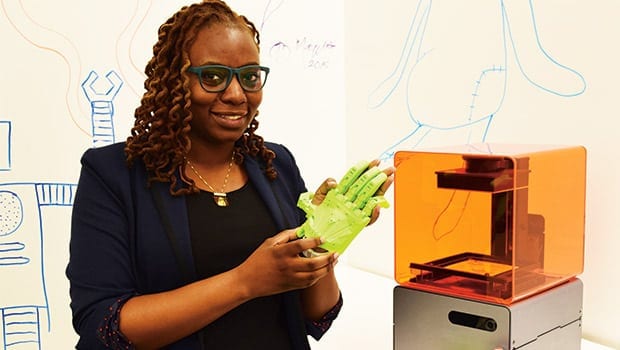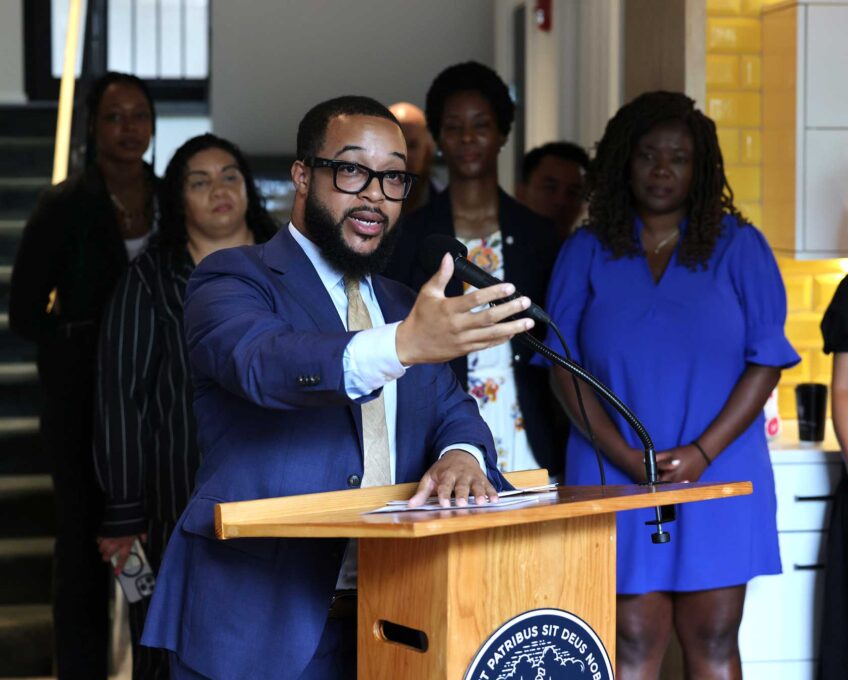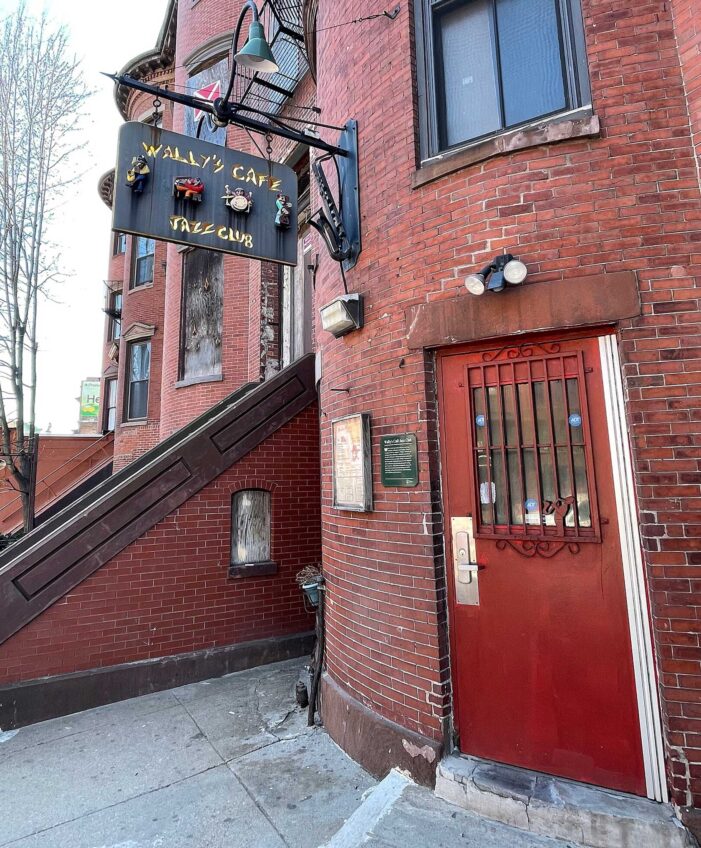Fabricating new business
Fab Lab comes to Dudley Square Roxbury Innovation Center

The Roxbury Innovation Center opened last September in Dudley Square and has been busy with over 50 events supporting the area’s small business entrepreneurs, specifically focusing on how to start and grow a company. But this week saw the opening of a key component of the center, which will help hands-on development of products — Fab Lab Roxbury.

Author: Martin DesmaraisThe Epilog Mini Laser Cutter at Fab Lab Roxbury.
While innovation centers have been shown to be crucial in helping establish and solidify a startup ecosystem, the concept of a Fab Lab delves into the practical. It is a digital fabrication workshop containing tools such as a laser cutter and 3D printer that help entrepreneurs put concepts to work to see if a vision for a product can be realized.
Fab Lab Roxbury is part of an official network of 1,000 Fab Labs in 30 countries around the world, which was pioneered by MIT and now backed by the college’s Fab Foundation.
The Fab Foundation’s Sarah Boisvert worked with the Roxbury Innovation Center to get its Fab Lab up and running.
According to Boisvert, one of the crucial parts about Fab Labs is that they all have to follow specific guidelines and have the same machines, which makes it easier for the Fab Foundation to support them all effectively and also ensure the most chance of successfully helping design and innovation.
Fab Labs must use industrial grade fabrication and electronics tools, with software and programs from MIT. Specific equipment includes a laser cutter that makes 2D and 3D structures, a vinyl cutter that can make antennas and flex circuits, a high-resolution milling machine that makes circuit boards and precision parts, a large wood router for building furniture and housing, and electronic components and programming tools to make circuit prototypes.
While the equipment may be uniform, Boisvert pointed out that they can be used to develop a wide variety of products and, in this way, each Fab Lab can be focused on the needs of the entrepreneurial community it is supporting.
For Fab Lab Roxbury this might mean products related to the food industry or making signs or designs for jewelry. Fab Labs have also been used to develop and design medical devices, wearable technology and all types of robotics. The real mindset behind Fab Lab innovation is that you can make anything and everything there.
“People will have an idea to make something and don’t know how to make it and they go into the lab for help and guidance and training,” Boisvert said.
Of course, these type of design services aren’t new. Commercially, any company can pay engineers and designers to do the work, but will just have to shell out big bucks for it. The problem is most small businesses can’t afford that.
“What I see the Fab Labs doing is taking digital fabrication and all of these tools and 3D printing out of the colleges and out of the high-end companies and making it accessible to anyone with any idea,” Boisvert added. “It lowers the barriers to market entry when you have somebody who can run into the Fab Lab and, for a minimal cost, do it themselves as opposed to having to pay a high-end company to do it for them.”
Kevin Wiant, executive director of Venture Café, which operates the Roxbury Innovation Center, District Hall in Seaport, and business innovation events in Kendall Square, said the focus of Fab Lab Roxbury will be on entrepreneurship, but a secondary focus will be on supporting STEM (Science, Technology, Engineering and Math) education.

Author: Martin DesmaraisAlessandra Brown, Roxbury Innovation Center’s program manager, inside the Fab Lab.
The Fab Foundation also emphasizes this. The STEM component emerged as schools near Fab Labs adopted them as places for project-based, hands-on education. Students are able to learn by creating and designing objects related to class topics.
With the headquarters of Boston Public Schools right across the hall in the new Bruce C. Bolling Municipal Building in Dudley Square, where the Roxbury Innovation Center is located, Wiant said working with BPS to incorporate the Fab Lab into the city’s education makes perfect sense and is already in the works.
Overall, the combination of the Fab Lab with the Roxbury Innovation Center’s other programs is the one-two punch Boston officials envisioned when plans for the center were pitched several years ago.
“It is a place where people can just drop in from the community and say, ‘I have an idea. I have a business. How might I move that forward?’” said Wiant. “We can give them some of our own advice and then we can point them toward this class or this workshop or say go talk to this person.”
In the startup world, success is often attributed as the ability to go from “concept to consumer,” and the Fab Lab is a major step in giving the Roxbury Innovation Center all the tools it needs to help local entrepreneurs do so.
Alessandra Brown, the Roxbury Innovation Center’s program manager, will incorporate the Fab Lab into the many programs the center already runs and is planning a whole slate of programs for the Fab Lab.
First up is to offer education courses so that entrepreneurs can learn how to use the equipment in the Fab Lab. There are also plans to run a student class during February school vacation focused on designing wearable devices.
She views the Fab Lab as a major asset to everything the center does.
“We have entrepreneurs and innovators who are already working on projects for which they will use this equipment and need this equipment for prototyping,” Brown said. “We have also been having conversations with local organizations — the incubators and the accelerators — to find out how their businesses can use this space.”






